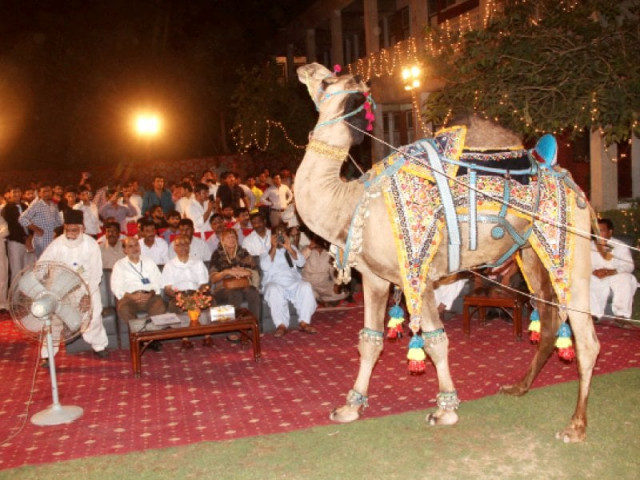World Camel Day: Disease threatens South Asia camels
Experts say Pakistani breeders can earn foreign exchange by exporting camels to Middle East.

A camel adorned with decorative cloth and tassels was brought to the seminar at University of Agriculture Faisalabad. PHOTO: EXPRESS
Various diseases threaten the camels in South Asia and Middle East, said experts at a seminar organised to mark the World Camel Day on Saturday.
The seminar was arranged by the Livestock Management Department, University of Agriculture Faisalabad (UAF), in collaboration with the Camel Association of Pakistan at New Senate Hall.
German scientist Dr Ilse Kohler-Rollefson told the seminar that there were around one million camels in Pakistan. She stressed the need for creating the markets for camels that would help in poverty alleviation. “A declining trend in camel population is being witnessed in India. Twenty years ago, India also had one million camels. However, the number has now dropped to 200,000,” she said. UAF Vice Chancellor Prof Iqrar Ahmad Khan said that all species of livestock were important to meet the growing demand of milk and meat at a time when the world faced the threat of climate change.
He said that the UAF was trying to promote the use of camel milk. “Camel milk is highly nutritious and contains only 2 per cent fat. It is also rich in vitamin C, iron and calcium,” he said.
“People here only focus on cows and buffaloes. A camel can live without water for two weeks and is extremely heat tolerant,” he said.
He said that in the Middle East, camels were in high demand and Pakistani breeders could earn foreign exchange by exporting the animal.
International Society of Camel Research Development representative Dr Abdul Raziq said that camels could play an important part in the food chain if global temperatures increased further. “Not enough research work is being done on genetics and breeding of camels, which is a matter of concern,” he said. Faculty of Animal Husbandry Dean Prof Ahsanul Haq said that camels had always been the best means of transportation in deserts. He said camel milk could help overcome malnutrition in backward areas.
Livestock Management Department chairman Prof Muhammad Younas said that there was not enough data available on camels in the country. He said that the university had formed a plan to market camel milk.
Rakh Mahni Camel Breeding and Research Station official Dr Shahid Nabeel said that there were five breeds of camels in the Punjab and his department was doing research on camel breeding. Prof Zafar Iqbal Qureshi also spoke there.
Published in The Express Tribune, June 22nd, 2014.



















COMMENTS
Comments are moderated and generally will be posted if they are on-topic and not abusive.
For more information, please see our Comments FAQ